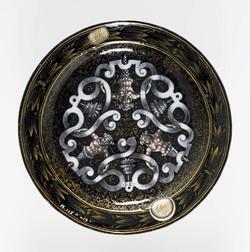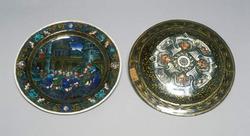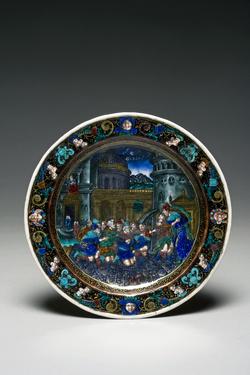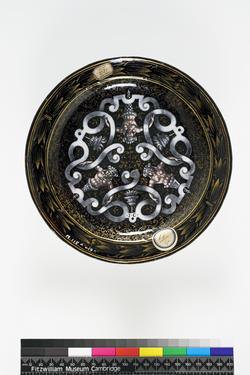Current Location: Gallery 32 (Rothschild)
Titles
Joseph reconciled to his brothers embraces Benjamin
Maker(s)
Maker:
Court dit Vigier, Jean I
(Possibly)
Maker:
Court dit Vigier, Jean II
(Possibly)
Entities
Categories
Description
Copper, the front enamelled in polychrome, partly over silver paillons, and gilded with Joseph reconciled to his brothers embracing Benjamin, and the back in grisaille with a radiating design of terms and torches linked by strapwork. Signed "I.C." in black on white strapwork below one of the torches.
Circular copper plate with slightly raised applied edge, narrow sloping rim, shallow curved sides (cavetto), and almost flat centre. On the reverse, there are a series of irregularly placed small holes in the enamel at the junction of the rim and well. The plate has a manganese-black ground. The polychrome design in the well is enamelled over a white layer in translucent bright blue, turquoise, green, yellow, mulberry, and red, with silver foils under the costume and carpet, and in black, opaque white and flesh pink, enhanced by gilding. The reverse is painted in grisaille with flesh pink, and gilding. The well is decorated with Joseph reconciled to his brothers embracing Benjamin. The action takes place in a townscape with on the right, a tower with a buttress; in the middle an arcade with a domed circular building behind it, and on the left a building with a balcony over the doorway. In the foreground there is a blue pavement with tiles decorated in gold with a circular motifs and stylized flower heads. Joseph stands on the right embracing one of his brothers, probably Benjamin, the other ten kneel in the centre. A purple greyhound crouches in the foreground. On the left, Pharaoh sits or stands on a balcony with a red rug hanging from it, and below there are two small standing figures in a doorway and two more approaching them The sky is inscribed in gold "G.XLV." The sides are decorated with gold foliated scrolls with two narrow bold bands below. Above, a band of copper is visible through the enamel. The rim is decorated with two different female masks with draped fabric headdresses, and two different male masks with large ears and earrings, separated by pairs of tritons with tablets on their tails flanking turquoise two-handled vases, with sprays of gold foliage in the background and a very narrow gold band next to the white rim.
The reverse is painted in grisaille and flesh-pink with three terms and three flaming torches linked by scrolling strapwork on a black ground decorated with gold ara\'acbesques and scrolls. On the rim between pairs of gold bands there is a wreath of gold laurel leaves and berries. On the strapwork are the initials '"I.C"
Notes
History note: Baron James de Rothschild (1792-1868); his son Baron Gustave de Rothschild, Paris (1829-1911); his grandchildren Sir Philip Sassoon and the Countess of Rocksavage, sold Christie’s, 26 November 1919, Catalogue of Objects of Art Porcelain & Faience, Fine French Tapestry, the property of Sir Philip Sassoon, BT., M.P., C.M.G., and the Countess of Rocksavage of 25 Park Lane, p. 8, part of lot 63; Durlacher Bros.; Walter S. Burns, Esq.,, North Mymms Park, Herts; Mrs Walter Burns; sold Christie's, 28 June 1935, Catalogue of highly important enamels, faience and majolica and works of art, the property of Mrs. Walter Burns (from the Collection of the late Walter S. Burns, Esq.) p. 5, lot 11, part III. Louis C.G. Clarke, MA, LL.D. (1881-1960), Cambridge.
Legal notes
Louis.C.G. Clarke Bequest, 1960
Measurements and weight
Diameter: 19.8 cm
Height: 1.9 cm
Acquisition and important dates
Method of acquisition: Bequeathed
(1961-04-27)
by
Clarke, Louis Colville Gray
Dating
16th Century, Late-17th Century, Early
Henry III of France
Henry IV of France
Circa
1585
CE
-
Circa
1600
CE
Note
The Biblical story of Joseph told in Genesis, was a common theme for the decoration of domestic objects in France in the second half of the 16th century. Limoges enamellers decorated caskets, ewers, dishes, and small plates with Joseph scenes. Although no complete sets are known, this plate was probably one of a set of twelve each decorated with a different event in the story, beginning when Joseph was already the slave of Potifar in Egypt, and extending from his rejection of the enticements of Potiphar’s wife (Genesis 39.7) to his reconciliation with his brothers (Genesis 45.14-16). Ten of the scenes were closely based on Bernard Salomon's woodcut illustrations to Claude Paradin’s 'Quadrins historiques de la Bible', first published by Jean de Tournes in Lyon in 1553. An augmented edition appeared in 1555, reprinted in 1558 and 1560, and another augmented edition in 1583. Each page had the biblical reference at the top, a woodcut, and an explanatory verse below. Another work of the same type, Guillaume Guéroult’s 'Figures de la Bible illustrées de huictains francoys . . . (Guillaume Roville), Lyons, 1564 (2nd edn, 1565), with illustrations by Pierre Eskrich was used for the 7th and 10th plates in the series, and the 12th has aspects from the woodcuts in both publications. These books can be viewed online in the Gallica website of the Bibliothèque nationale.
This plate is decorated with the last scene in the series which occurs in Genesis 45. Joseph is shown with his brothers, rejoicing and weeping over them, and is embracing one, probably Benjamin, as mentioned in the Bible story. The scene was copied from the woodcut titled ‘GENESE XLV’.by Bernard Salomon in Claude Paradin’s, Quadrins Historique de la Bible, Lyon, 1553, or a later edition. However, the tower on the right, with its arched buttress, was taken from Pierre Eskrich's woodcut in Guillaume Guéroult’s 'Figures de la Bible illustrées de huictains francoys . . .' (Guillaume Roville), Lyons, 1564 or 1565. In Quadrins historiques ... , the previous scene shows Joseph enthroned revealing his identity to the brothers, but the scene on the plate has usually been described as if it were that. At least two more and possibly further plates decorated with this subject are known: a 20 cm plate also initialled I.C. on the back, was in the Rev. A.H.S. Barwell’s bequest to the British Museum (1913,1220.59), and another, 19.8 cm in diameter bequeathed by William G. Mather to the Cleveland Museum of Art, Ohio (1951.326), possibly the plate decorated with this subject formerly in the Marlborough, Spitzer, and J.E. Taylor Collections. Although this plate was in the same collection as M.115B-1961 in the nineteenth century, it is unlikely to have been from the same set originally, because it has a different ground colour.
The overall appearance of these plates, the border on the fronts, and the style of grisaille decoration on the reverses, is comparable to a set of plates decorated with scenes from the Life of the Virgin signed' I.C.' . These have the de Vic arms below on the rims, probably for Méry de Vic (d. 1622), who had been resident in Limoges as intendant during 1588 and 1589, while on a mission to restore order in the region for Henry III, and after his assassination in August 1589, had transferred his allegiance to Henry IV. It seems possible that the plates were made about that time, and if not, before 1603 when a change was made to the de Vic arms.
The initials ‘I•C’ occur on a great many enamels made during the second half of the 16th and early 17th century. It therefore seems likely to have been a workshop mark used succesively by members of the Court family. These were Jehan or Jean Court dit Vigier I (d. 1592) and his son, Jean Court dit Vigier II (b. c.1575-d. between 1631-5); and a relative, Jehan Court le jeune who married in 1613, and died between 1627-31, may also have used the mark, but was probably too young to have decorated the 'Joseph Plates'. (See Documentation, Beyssi-Cassan, 2006)
School or Style
Renaissance
Mannerism
People, subjects and objects depicted
Components of the work
Decoration
composed of
enamel
( translucent blue, turquoise, green, yellow, mulberry, red, flesh pink, opaque white and black)
gilding
Decorating
Materials used in production
Copper
Techniques used in production
Raising (metal forming process)
: Copper with series of irregularly placed small holes in the enamel at the junction of the rim and well. The plate has a dark mulberry-brown (manganese) ground appearing black. The polychrome design in the well is enamelled over a white layer in translucent bright blue, turquoise, green, yellow, mulberrym and red, with silver foils under the costume and carpet, and in black, opaque white and flesh pink, enhanced by gilding. The reverse is painted in grisaille with flesh pink, and gilding
Inscription or legends present
- Text: .G.XLV.
- Location: On front in sky
- Method of creation: Painted in gold
- Type: Inscription
- Text: .I .C.
- Location: On back on white strapwork below one of the torches
- Method of creation: Painted in black
- Type: Initials
Inscription present: rectangular with cut corners, printed in black with a line border
- Text: UNION/ CENTRALE with between the words in black ink 124/2787
- Location: On back
- Method of creation: Printed in black and hand-written in black ink
- Type: Label
Inscription present: circular paper label
- Text: 11/4
- Location: On back
- Method of creation: Printed in blue and hand-written in pencil
- Type: Label
References and bibliographic entries
-
Exposition de 1865. Palais de l’Industrie, Musée Rétrospectif. Catalogue des objets d’art et de curiosité exposés au Musée Rétrospectif ouvert au Palais de l’Industrie en 1865
page(s): 225
-
Catalogue of objects of art, porcelain and faience and fine French tapestry, the property of Sir Philip Sassoon Bart, MP, CMG and the Countess of Rocksavage of 25 Park Lane
page(s): 8
-
Catalogue of highly important enamels, faience and majolica and works of art, the property of Mrs. Walter Burns (from the Collection of the late Walter S. Burns, Esq.
-
L’histoire de Joseph sur des assiettes en émail peint de Limoges par l’atelier portant la marque de fabrique “I.C.
-
Les émaux peints de Limoges. Musée du Louvre, Département des objets d'art
page(s): 317, 350-7
-
Le métier d’émailleur à Limoges, XVIe-XVIIe siècle
page(s): 378-80
-
Bernard Salomon Illustrateur Lyonnais
page(s): 130-3, 291-3
-
Chronique de l’orfèvrerie et de l’émaillerie anciennes de Limoges en 1912
page(s): 468
-
Catalogue Raisonné: or, a List of the Pictures in Blenheim Palace; with Occasional Remarks and Illustrative Notes, Part I and Part II
-
Catalogue of the Special Loan Exhibition of Enamels on Metal held at the South Kensington Museum London in 1874
-
The Wallace Collection, Catalogue of Glass and Limoges Painted Enamels
-
Sir Philip Sassoon at 25 Park Lane: the collection of an early twentieth-century connoisseur and aesthete
page(s): 151-70
Related exhibitions
Identification numbers
Accession number: M.115A-1961
Primary reference Number: 139826
Stable URI
Audit data
Created: Saturday 6 August 2011
Updated: Tuesday 5 November 2024
Last processed: Tuesday 13 May 2025
Associated departments & institutions
Owner or interested party:
The Fitzwilliam Museum
Associated department:
Applied Arts
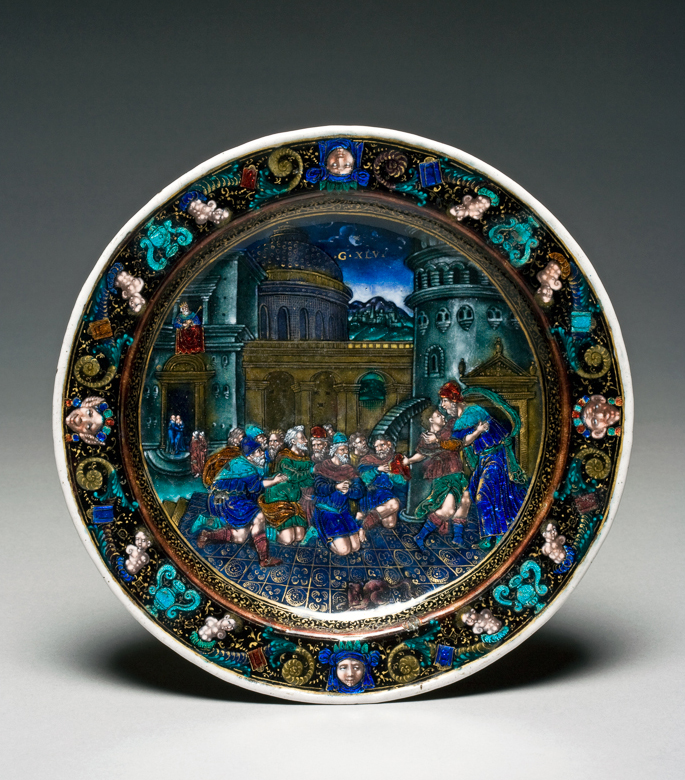
 IIIF Manifest
IIIF Manifest
